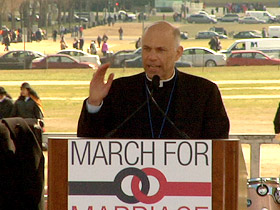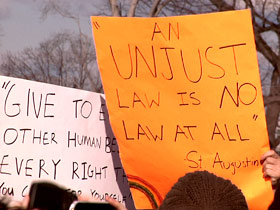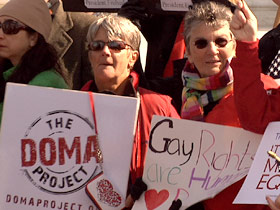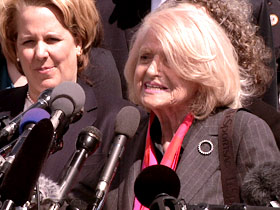In This Episode << SLIDE LEFT TO SEE ADDITIONAL SEGMENTS
Same-Sex Marriage
BOB ABERNETHY, host: The Supreme Court heard arguments over same sex marriage this week—whether California could ban it outright under Proposition 8 and whether Congress could deny federal marital benefits to same sex couples under the Defense of Marriage Act. While Justices expressed misgivings about both measures, they also seemed to doubt whether they can, or should, resolve such conflicts. Tim O’Brien attended both hearings and files this report.
TIM O’BRIEN, correspondent: The debate over same-sex marriage that has so divided the country brought thousands on both sides of the issue to the Supreme Court Tuesday and Wednesday. They were passionate, and together they made it one of the largest demonstrations at the high court in decades. Defenders of traditional marriage also held a separate demonstration on the National Mall.
Religious groups do not speak with one voice on the same-sex marriage issue, but more oppose it than support it.
Salvatore Cordileone, Archbishop of San Francisco, is one of the co-authors of Prop 8. He also chairs the committee on marriage of the U.S. Conference of Catholic Bishops.

ARCHBISHOP SALVATORE CORDILEONE (Archbishop of San Francisco): Why really, though, are we here? One simple reason: marriage matters to kids. What could be more beautiful or even more sacred than a man and a woman coming together to create new life?
O’BRIEN: In court Tuesday, lawyers defending Proposition 8 pressed that argument—that it furthered the state’s interest in procreation and child rearing—to some skeptical Justices:
JUSTICE STEPHEN BREYER: In California, couples that aren’t gay, but can’t have children, get married all the time.
CHARLES COOPER (Attorney): Yes your honor. The concern is that re-defining marriage as a genderless institution will sever its abiding connection to its historic, traditional procreative purposes. And it will re-focus the purpose of marriage and the definition of marriage away from the raising of children and to the emotional needs and desires of adults.
JUSTICE ELENA KAGAN: Suppose a state said “because we think that the focus of marriage should be on procreation, we’re not going to give marriage licenses any more to any couple where both people are over the age of fifty-five.” Would that be constitutional?
COOPER: No, your honor. It would not be constitutional.
JUSTICE KAGAN: Because that’s the same state interest, I would think. You know, if you’re over 55, you don’t help us serve the government’s interest in regulating procreation through marriage.

O’BRIEN: There has been growing support for same-sex marriage. A majority of Americans now support it. Nine states now allow it, three of them added only last November.
In urging the Supreme Court to find Prop 8 unconstitutional, Attorney Theodore Olson insisted gays and lesbians must have the same fundamental right to marry as heterosexual couples.
THEODORE OLSON (Attorney): It is just wrong. It is not consistent with the ideals, and the laws and the Constitution of this country to take our gay and lesbian brothers and sisters and put them in a class, and deny them rights that we give to everyone else.
(in court): The case that’s before you today is whether or not California can take a class of individuals based upon their characteristics, their distinguishing characteristics, remove from them the right of privacy, liberty, association, spirituality and identity that marriage gives them.
O’BRIEN: But as the hour long argument came to a close, several Justices did not appear ready for a broad national ruling.
JUSTICE SAMUEL ALITO: Traditional marriage has been around for thousands of years. Same-sex marriage is very new. I think it was first adopted in the Netherlands in 2000. So there isn’t a lot of data about its effect. But you want us to step in and render a decision based on an assessment of the effects of this institution which is newer than cell phones or the Internet. I mean we—we are not—we do not have the ability to see the future.

O’BRIEN: Notwithstanding all the attention the case has generated, the Court could avoid deciding it on a procedural issue: California chose not to appeal a lower court decision invalidating Prop 8 and the Justices could find that the amendment’s supporters have no legal standing to continue the case on their own.
A similar issue could derail the case challenging the Defense of Marriage Act—or DOMA—which denies gays and lesbians the federal marital benefits routinely accorded heterosexual couples. When the Obama administration declined to appeal lower court rulings finding DOMA unconstitutional, House Republican leaders stepped in to continue the fight.
The case was brought by Edie Windsor, now 84, whose spouse and companion of forty years passed away in 2009, leaving Edie the bulk of her estate. That resulted in a federal estate tax of $363,000 dollars. Even though New York recognized their marriage, she did not qualify for the federal marital deduction because of DOMA. Windsor sued the United States and won.
EDIE WINDSOR: We did win in the lower courts. Today is like a spectacular event for me, I mean it’s a lifetime kind of event, and I know that the spirit of my late spouse, Thea Spayer, is right here watching and listening and would be very proud and happy of where we’ve come to.

O’BRIEN: Windsor sat quietly in the front row of the spectators’ section as at least five Justices cast doubt on the wisdom, if not the constitutionality of DOMA.
Justice Kennedy, a moderate whose vote could be crucial, saw DOMA as intruding on matters historically left to the states:
JUSTICE ANTHONY KENNEDY: You are at real risk of running in conflict with what has always been thought to be the essence of the state police power, which is to regulate marriage, divorce, custody.
JUSTICE SONIA SOTOMAYOR: What gives the federal government the right to be concerned at all at what the definition of marriage is?
JUSTICE RUTH GINSBURG: You’re saying, “No. State, there are two kinds of marriages, the full marriage and then this sort of skim milk marriage.” (laughter)
O’BRIEN: Windsor’s lawyers pointed out that DOMA affects far more than just estate taxes, that there are more than 1,100 laws that treat gay and lesbian couples differently than heterosexual couples.
JAMES ESSEX (American Civil Liberties Union): Your Social Security benefits and your survivor benefits change based on whether you are married or not, whether you get family medical leave to take care of your spouse depends on whether the federal government recognizes that your spouse is your “spouse.” Veterans benefits change, and yes, taxes change as well.

O’BRIEN: The Justices took their tentative vote in the cases Friday but no formal decisions are expected until late June. And the possibility remains they could opt to dismiss one or both cases without any meaningful decision at all.
BOB ABERNETHY, host: Tim, nobody can predict what the Court will do, but as you listened to the justices in the Court, what was your sense of how they’re leaning?
O’BRIEN: It is perilous to predict a Supreme Court decision, but in this case it seemed pretty clear that both of these propositions, both of these measures, Proposition 8 and DOMA, are in real trouble. I’d be surprised if either one of them is upheld.
ABERNETHY: And if that is what the Court does, then what is the future for gay marriage?
O’BRIEN: Well, with DOMA it’s very easy. The federal government cannot deny marital benefits to same-sex married couples. With Prop 8, there’s a lot out there. We expect a very narrow decision that will affect only California, but a real huge, landmark decision is in play. I think it’s possible, although remote, but a decision that will require every state to recognize same-sex marriage and prohibit discrimination based on sexual orientation, from Congress to the town school board.
ABERNETHY: Did you also get the sense that the justices are considering whether the country is ready for gay marriage?
O’BRIEN: You know, Bob, so seldom is that a consideration by the justices, but I did get the sense it is a consideration in this case. Justice Sotomayor noted it took fifty years for the Court to rule in Brown v. Board of Education, desegregating the nation’s schools. That is a big concern which raises another question: if not now, when?
ABERNETHY: Tim O’Brien. Many thanks.
O’BRIEN: A pleasure.

